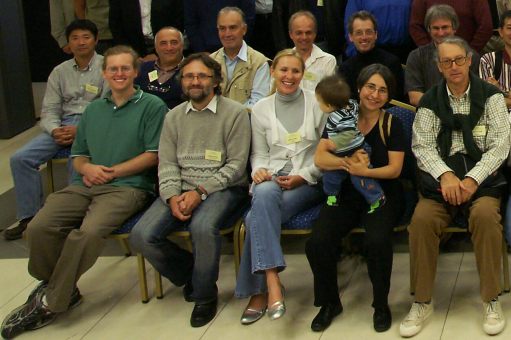
ATLAS e-News
23 February 2011
CERN childcare initiative
22 July 2008

Cigdem Issever, like many other parents with young kids, has to take care of her son while attending conferences and meetings such as the Topical Workshop on Electronics for Particle Physics (TWEPP07) in Prague.
Over the years, many people have expressed a need for CERN to provide or facilitate affordable day care, both for the children of CERN users, and for those of its own employees.
With the aim of changing the current limited childcare situation, the CERN Childcare Initiative was created in October 2007 by a group of people who felt strongly about this issue. Members of the initiative include both, CERN staff and users, who come from CERN’s various collaborations. Cigdem Issever, an ATLAS physicist from Oxford University, is head of this initiative. As the mother of a 18 months old child, she knows well the difficulties of parents at CERN.
“One of the biggest problems at the moment for parents at CERN is that existing facilities are not affordable for most of the parents and also, there is no childcare available for children under two years old,” she says. To help cope with the lack of childcare facilities for children below two years, from September 2008, CERN has reserved twenty places in a new creche in Meyrin that will offer care to children between four months and four years.
In order to quantify the childcare needs at CERN, the Childcare initiative performed a survey in February 2008 among CERN users and staff. A questionnaire was sent to members of ATLAS, ALICE, CMS and LHCb collaborations. In total, 129 responses were recorded, which is only a small fraction of CERN parents. The conclusions based on this survey only show the tip of the iceberg. “The survey reveals that existing childcare facilities do not meet the needs of parents working at CERN,” Cigdem explains. These results were presented to CERN management and representatives of the institutes at the Advisory Committee of CERN Users (ACCU) meeting on June 11th. The survey also shows that traditional family structures do not exist anymore. For more than 70% of researchers who replied to the survey, their partner were also working full-time, which means that access to affordable childcare facilities is essential for them.
“The problem is not only that the number of places is insufficient, but also that the fees for childcare are unaffordable for most parents and in particular for those, mostly users, who do not get any allowances. Typical fees per month range between 1500 to 2000 CHF,” Cigdem adds.
According to the survey, CERN should provide at least 120 more places year-round plus an additional 20 places in the summer months for children of researchers coming to CERN in addition to the existing facilities. The data of the survey shows that in order to meet just the needs of the researchers who replied to the survey at least 40 places are needed for children below 2 years. While the 20 reservations at the Meyrin crèche are a start, more will be needed.
The CERN Childcare Initiative not only identified that there is a lack of affordable childcare at CERN but also identified a possible funding source for CERN to subsidize childcare for parents at CERN. In May 2006, the European Commission presented its Roadmap for the period 2006–2010 to all European stakeholders involved in equality between women and men. This was a major event which brought together a panel of ministers and representatives of the European institutions, along with academic experts and field players. The Roadmap sets out priorities for EU action on gender equality for the period 2006–2010 such as equal economic independence for women and men, and reconciling professional life with private and family life. During this conference the commission agreed to achieve the provision of childcare by 2010 to at least 90 % of children between 3 years old and school age and at least 33 % of children below 3 years of age (EUROSTAT).
The survey shows that CERN does not yet meet this but the EU has funds available to help organizations like CERN reach these targets. These funds are available through the European Social Fund (ESF) for member states but only organizations can apply for them. Cigdem says: “In order to get this funding, we need help from the CERN management and legal office to draft and submit the application.”
“Childcare needs should be organized centrally. It is not realistic to assume that each of the individual institutes scattered all over the world could assist their staff in childcare related issues remotely,” she adds.
The good news is that Maximilian Metzger, Secretary General in the DG's office, agreed during the ACCU meeting to investigate how CERN can apply for ESF funding for childcare facilities. Such a proposal could for example include the project in Archamps (Haute-Savoie) where a construction of several hundred apartments and a few villas is planned. The project director of this development project indicated that there is a possibility to provide facilities for CERN like conference or meeting rooms, transportation to and from CERN and also a crèche.
“The project in Archamps shows that local developers are interested in providing housing with childcare facilities for people working at CERN. It would be great if the CERN management would investigate such avenues but most importantly, apply for ESF funds to subsidize additional facilities here on site” Cigdem says.
Everybody interested in keeping up-to-date on this or willing to help can add their name to the cern-users-childcare@cern.ch mailing list, or contact Cigdem directly.
